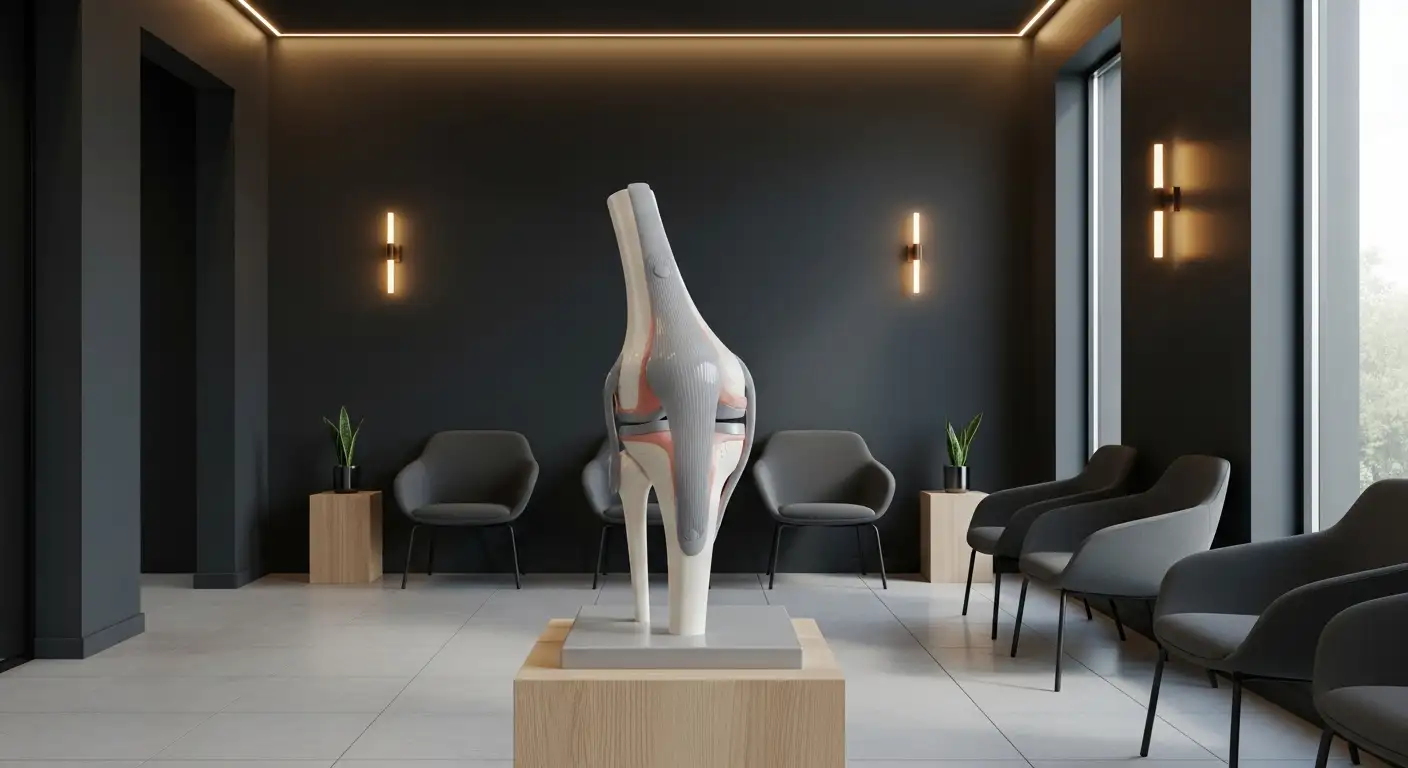Understanding Swollen Lymph Nodes
When discussing the issue of a swollen knee, it's important to take into account the potential role of swollen lymph nodes, or lymphadenopathy, in this condition.
Definition and Causes
Swollen lymph nodes are a symptom of various underlying conditions, including infections, autoimmune diseases, certain medications, and even cancer. This condition arises when lymph nodes, critical elements in the immune system, become enlarged due to inflammation, leading to pain or tenderness.

The swelling can occur due to a viral infection, and these nodes typically return to normal once the infection resolves. Antibiotics, however, are not effective in treating viral infections. The treatment for swollen lymph nodes stemming from other causes depends largely on the underlying cause [2].
Importance of Lymph Nodes
Lymph nodes are integral components of the immune system. They filter foreign invaders, such as bacteria and viruses, from the lymph fluid using lymphocytes, a type of white blood cell. The swelling of lymph nodes is a common occurrence when the body is actively fighting an infection [1].
Understanding the role and importance of lymph nodes is crucial in the context of the swollen lymph nodes behind the knee. By addressing the root causes and treating them appropriately, it is possible to alleviate the symptoms and ensure the overall health of the individual.
Swollen Lymph Nodes Behind the Knee
Swollen lymph nodes behind the knee, known as popliteal lymph nodes, can be a cause for concern. Understanding their location, function, and common causes of swelling is crucial for appropriate care and management.
Location and Function
The popliteal lymph nodes are located in the tissues behind an individual's knee. They play a critical role in filtering lymph fluid and identifying foreign bodies or pathogens, thus participating in the body's immune response. When these nodes swell, it often signifies that the body is attempting to combat an underlying issue [3].
Common Causes of Swelling
The swelling of popliteal lymph nodes can occur due to various conditions, most commonly infections and autoimmune disorders. Additionally, localized injury or arthritis can also lead to swelling.
Interestingly, the source of infections leading to swollen lymph nodes behind the knee often originates from the lower leg, foot, or inner thigh, not necessarily the knee itself [4].
While it's less common, cancer can also cause swollen lymph nodes behind the knee. However, most cases of swelling are not cancer-related.
Understanding the common causes of swelling in the popliteal lymph nodes can help individuals seek appropriate medical attention and treatment. It's essential to consult with a healthcare provider if you notice persistent swelling or other associated symptoms.
Symptoms and Diagnosis
Recognizing the symptoms and understanding the diagnostic procedures of swollen popliteal lymph nodes can be crucial for timely intervention and treatment.
Recognizing Swollen Popliteal Lymph Nodes
Swollen popliteal lymph nodes behind the knee often result from infections or injuries to the lower leg, foot, or the inner thigh, not necessarily originating from the knee itself. When the lymph nodes swell, it often indicates an underlying issue the body is trying to fight off.
The symptoms of swollen popliteal lymph nodes can include redness, warmth, and tenderness in the affected area. These symptoms typically resolve within 2 weeks after the infection subsides [5]. However, if the swelling is caused by a more serious condition, such as cancer, the symptoms may persist and additional signs may be present.
Diagnostic Tools and Procedures
Diagnosing swollen popliteal lymph nodes is often a multi-step process that starts with a physical examination. During this exam, a healthcare professional may be able to feel a lump in the popliteal fossa, the area behind the knee.
Further diagnostic procedures may include imaging studies like computed tomography (CT) scans. However, diagnosing the exact cause can be challenging due to numerous conditions causing lymphadenopathy, requiring tests like blood tests, biopsies, and consultations with multiple doctors [5].
It's important to note that while swollen popliteal lymph nodes may be caused by cancer, most swollen lymph nodes are not due to cancer according to the American Cancer Society (ACS) [5]. Nevertheless, a proper assessment by a healthcare professional is crucial for determining the cause of swollen lymph nodes behind the knee, as the treatment will depend on the underlying condition.
Treatment Options
When dealing with swollen lymph nodes behind the knee, it's crucial to explore viable treatment options. The course of treatment typically depends on the underlying cause of the swelling.
Addressing Underlying Causes
Swollen lymph nodes, medically known as lymphadenopathy, are not a disease in themselves but a symptom of an underlying condition. These conditions may include infections, autoimmune diseases, certain medications, and cancer.
For instance, if the swollen popliteal lymph nodes behind the knee are caused by a localized infection, injury, or arthritis, treating these conditions often leads to a reduction in the swelling.
Moreover, swollen lymph nodes caused by a virus usually return to normal after the viral infection resolves. It's important to note that antibiotics are not useful to treat viral infections. Treatment for swollen lymph nodes from other causes depends on the cause.
To ascertain the underlying cause, healthcare providers may conduct a physical examination and additional diagnostic tests. These tests can include blood tests, imaging studies, lab cultures, or a biopsy of the lymph node itself. Additional tests like CT scans or biopsies may be recommended if cancer is suspected.
Supportive Therapies
Aside from treating the underlying cause, supportive therapies can be used to manage the symptoms of swollen lymph nodes. These therapies primarily aim to alleviate pain and discomfort associated with the swollen lymph nodes.
These supportive therapies may include over-the-counter pain relievers or anti-inflammatory drugs. In some cases, warm compresses may also be used to reduce swelling and relieve pain. It's essential to discuss these treatment options with a healthcare provider to ensure they're suitable for your specific condition and symptoms.
In conclusion, the treatment for swollen lymph nodes behind the knee primarily focuses on addressing the underlying cause. Once the root cause is treated, the swelling and associated symptoms often decrease. However, it's crucial to seek immediate medical attention if the swelling persists or if it's associated with severe or worsening symptoms. Always consult with a healthcare provider to determine the best course of treatment for your condition.
When to Seek Medical Attention
While swollen lymph nodes behind the knee can sometimes resolve on their own, certain signs and symptoms may indicate a need for immediate medical attention. Recognizing these signs can be crucial in identifying and treating serious conditions in a timely manner.
Signs of Serious Conditions
Persistent or worsening lymphadenopathy (swelling of the lymph nodes) may be a sign of a more serious condition that requires immediate medical attention. Swollen lymph nodes that are hard, fixed, or rapidly growing could indicate lymphoma, a type of blood cancer, along with other symptoms like night sweats, shortness of breath, and unintended weight loss.
Swollen popliteal lymph nodes may also be due to cancer, but it is rare for cancer to affect the popliteal lymph nodes. Several cancers, such as lymphomas and other types that can spread to the lymph nodes, might be responsible for lymphadenopathy [5].
Red Flags for Immediate Care
If you notice any of the following signs or symptoms, seek immediate medical attention:
- Persistent swelling of the lymph nodes that does not improve with time
- Rapid growth of the lymph nodes
- Hard or fixed lymph nodes that cannot be moved with gentle pressure
- Accompanying symptoms such as night sweats, shortness of breath, or unintended weight loss
These could be indications of serious conditions such as lymphoma or other types of cancer that have spread to the lymph nodes. Timely diagnosis and treatment are crucial in managing these conditions effectively.
Remember, swollen lymph nodes behind the knee are not always a cause for concern. However, if you notice any unusual changes or if your symptoms persist, it's essential to seek professional medical advice. Early detection and treatment of potential serious conditions can significantly improve outcomes.
Swollen Lymph Nodes Behind the Knee
Swelling of lymph nodes, also known as lymphadenopathy, can occur in various parts of the body, including the area behind the knee. This region houses the popliteal lymph nodes, which can sometimes become enlarged due to various conditions.
Location and Function
The popliteal lymph nodes are located in the tissues behind a person's knee. They play a critical role in the body's immune system, helping to filter harmful substances and fight off infections. When the body is under attack from an infection, injury, or disease, these nodes can swell as they work to protect the body.
Common Causes of Swelling
Swelling of the popliteal lymph nodes, or swollen lymph nodes behind the knee, can be caused by a range of factors. According to Verywell Health, the causes of lymphadenopathy can be broadly classified as infectious, autoimmune, malignant (cancerous), or pharmaceutical (medication-related).
Localised infections, injuries, or arthritis can specifically lead to the swelling of the popliteal lymph nodes.
It's important to note that swollen lymph nodes are not a disease in themselves, but a symptom of an underlying condition. They may indicate that the body is trying to fight off an issue. In some cases, they can return to normal once the underlying condition, such as a viral infection, is resolved. The appropriate treatment for swollen lymph nodes depends on the underlying cause.
References
[1]: https://www.verywellhealth.com/what-are-lymph-nodes-2252380
[4]: https://www.womeninorthopaedics.com/blog/what-causes-swollen-popliteal-lymph-nodes-behind-the-knee/?blog_id=20619
[5]: https://www.medicalnewstoday.com/articles/picture-of-swollen-popliteal-lymph-nodes
[6]: https://www.verywellhealth.com/swollen-lymph-glands-2252581
[7]: https://www.mayoclinic.org/diseases-conditions/swollen-lymph-nodes/diagnosis-treatment/drc-20353906





